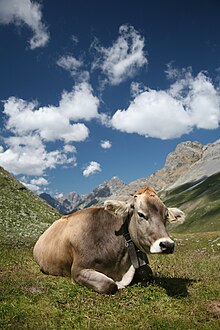Braunvieh
 |
|
| Other names | Schwyzer |
|---|---|
| Country of origin | Switzerland |
| Distribution | worldwide |
| Use | dairy |
| Notes | |
| Originally a triple-purpose breed, for milk, meat and draught | |
|
|
Braunvieh (German, "brown cattle") is a breed or group of breeds of domestic cattle originating in Switzerland and distributed throughout the Alpine region. The Braunvieh was originally a triple-purpose breed, used for milk production, for meat and for draught work; the modern Braunvieh is predominantly a beef breed.
The Braunvieh derives from the grey-brown mountain cattle raised from mediaeval times in the Swiss canton of Schwyz in Central Switzerland. Documents from the late fourteenth century at the Monastery of Einsiedeln record the export of such cattle to Vorarlberg, now part of Austria. The first known herd book for a cattle breed was that kept at the monastery for the Braunvieh from 1775 to 1782. A description from 1795 of Schwyzer cattle calls them the largest and finest of the country.
Braunvieh were shown at the Exposition Universelle of 1855 in Paris, and at the International Exhibition of 1862 in London.
The Schwyz and two other breeds of Alpine brown cattle were recognised in 1875, and in 1879 the three were combined into a single herd book with the name Schweizerische Braunvieh.
In 1897 a breeder's association, the Verbands Schweizerischer Braunviehzucht-Genossenschaften, was founded in Bünzen, in the canton of Aargau.
Between 1967 and 1998 there was substantial cross-breeding with the American Brown Swiss with the aim of improving milk yield, physical size, and udder conformation. In Germany what began as a programme of improvement became in effect a programme of substitution; by 1994 the genetic contribution of the Brown Swiss to the Braunvieh had reached 60%.
...
Wikipedia
